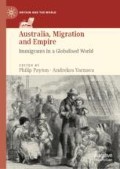Abstract
The history of British boy immigration to Australia in the early twentieth century shows how ‘imperial’ values could be combined with strong nationalism. This was the case with Dr Mary Booth, a Sydney physician and social activist. Her early career in eugenics also shows the influence of Progressivism, the US-originated reform movement beginning in the late nineteenth century. Always conservative, Booth appears to have been galvanised by the Great War into greater faith in both the British Empire and Australia, which was channelled into postwar British boy immigration aftercare. Brooklyn makes an important contribution to the history of Australian interwar nationalism through her analysis of Mary Booth’s activities in support of British boy immigration as an example of the melding of ‘traditional’ imperial nationalism with Progressive eugenic principles.
Access this chapter
Tax calculation will be finalised at checkout
Purchases are for personal use only
Select Bibliography
Aitken, Don, ‘“Countrymindedness”: The Spread of an Idea’, Australian Cultural History 4 (1985), 34–41.
Anderson, Warwick, The Cultivation of Whiteness: Science, Health and Racial Destiny in Australia. Carlton, VIC: Melbourne University, 2005.
Ashton, Paul, ‘“This Villa Life”: Town Planning, Suburbs and the “New Social Order” in Early Twentieth-Century Sydney’, Planning Perspectives 25, no. 4 (2010), 457–483.
Brooklyn, Bridget, ‘Claiming Anzac: The Battle for the Hyde Park Memorial, Sydney’, Melbourne Historical Journal 45, no. 1 (2017), 112–130.
Cole, Douglas, ‘“The Crimson Thread of Kinship”: Ethnic Ideas in Australia, 1870–1914’, Australian Historical Studies 14, no. 56 (1971), 511–525.
Constantine, Stephen, ‘Empire Migration and Social Reform 1880–1950’. In Migrants, Emigrants and Immigrants: A Social History of Migration. Edited by Colin G. Pooley and Ian D. Whyte. London: Routledge, 1991.
Curran, James, and Stuart Ward, The Unknown Nation: Australia After Empire. Carlton, VIC: Melbourne University Press, 2010.
Daniel, Esther, ‘“Solving an Empire Problem”: The Salvation Army and British Juvenile Migration to Australia’, History of Education Review 36, no. 1 (2007), 33–48.
Eddy, J. J., and Deryck Schreuder, ‘The Edwardian Empire’, in The Rise of Colonial Nationalism: Australia, New Zealand, Canada and South Africa First Assert their Nationalities, 1880–1914. Edited by John Eddy and Deryck Schreuder. Sydney: Allen & Unwin, 1988.
Gothard, Janine, ‘“The Healthy, Wholesome British Domestic Girl”: Single Female Migration and the Empire Settlement Act, 1922–1930’. In Emigrants and Empire: British Settlement in the Dominions Between the Wars. Edited by Stephen Constantine. Manchester: Manchester University Press, 1990.
Grant, Elspeth, and Paul Sendziuk, ‘“Urban Degeneration and Rural Revitalisation”: The South Australian Government’s Youth Migration Scheme, 1913–14’, Australian Historical Studies 41, no. 1 (2010), 75–89.
Horner, Jack, and Marcia Langton, ‘The Day of Mourning’, in Australians: A Historical Library; Australians 1938. Edited by Bill Gammage and Peter Spearritt. Sydney: Fairfax, Syme and Weldon, 1987.
Johnston, Scott, ‘“Only Send Boys of the Good Type”: Child Migration and the Boy Scout Movement, 1921–1959’, Journal of the History of Childhood and Youth 73 (2014), 377–397.
Jones, Greta, Social Darwinism and English Thought: The Interaction Between Biological and Social Theory. Sussex: Harvester, 1980.
Jupp, James, The English in Australia. Cambridge: Cambridge University Press, 2004.
Langfield, Michele, ‘Voluntarism, Salvation, and Rescue: British Juvenile Migration to Australia and Canada, 1890–1939’, The Journal of Imperial and Commonwealth History 32, no. 2 (2004), 86–114.
Lewis, Milton, Managing Madness: Psychiatry and Society in Australia 1788–1980. Canberra: Commonwealth of Australia, 1988.
McGregor, Russell, ‘The Necessity of Britishness: Ethno-Cultural Roots of Australian Nationalism’, Nations and Nationalism 12, no. 3 (2006), 493–511.
McKinnon, Alison, ‘“Bringing the Unclothed Immigrant into the World”: Population Policies and Gender in Twentieth-Century Australia’, Journal of Population Research 17, no. 2 (2000), 109–123.
Meaney, Neville ‘“In History’s Page”: Identity and Myth’. In Australia’s Empire. Edited by Deryck M. Schreuder and Stuart Ward. Oxford: Oxford University Press, 2008.
Michaels, Wendy, ‘When the Political Becomes Personal: Millicent Preston Stanley’s Embrace of Eugenics, 1915–1927’, ISAA Review 15, no. 2 (2016), 53–70.
Moses, John, ‘The Struggle for Anzac Day 1916–1930 and the Role of the Brisbane Anzac Day Commemoration Committee’, Journal of the Royal Australian Historical Society 88, no. 1, 54–74.
Murphy, Kate, ‘“The Modern Idea Is to Bring the Country into the City”: Australian Urban Reformers and the Idea of Rurality, 1900–1918’, Rural History 20, no. 1 (2009), 119–136.
Philippa Levine and Alison Bashford, ‘Introduction: Eugenics in the Modern World’, The Oxford Handbook of the History of Eugenics. Edited by Alison Bashford and Philippa Levine. New York: Oxford University, 2010.
Reiger, Kerreen, The Disenchantment of the Home: Modernizing the Australian Family 1880–1940. Melbourne: Oxford University Press, 1986.
Richards, Eric, Destination Australia: Migration to Australia Since 1901. Sydney: University of New South Wales Press, 2008.
Rodwell, Grant, With Zealous Efficiency: Progressivism and Tasmanian State Primary Education, 1900–20. Darwin: William Michael Press, c1992.
Roe, Jill, ‘Booth, Mary (1869–1956)’, Australian Dictionary of Biography, National Centre of Biography, Australian National University, http://adb.anu.edu.au/biography/booth-mary-5291/text8927, published first in hardcopy 1979. Edited by B. Nairn and G. Serle, vol. 7, Melbourne: Melbourne University, 1979, accessed online 17 February 2019.
Roe, Michael, Australia, Britain, and Migration, 1915–1940: A Study of Desperate Hopes. Cambridge: Cambridge University Press, 1995.
Roe, Michael, Nine Australian Progressives: Vitalism in Australian Bourgeois Thought 1890–1960. St Lucia: University of Queensland Press, 1984.
Sherington, Geoffrey, ‘“A Better Class of Boy”: The Big Brother Movement, Youth Migration and Citizenship of Empire’, Australian Historical Studies 33, no. 120 (2002), 267–285.
Sherington, Geoffrey, ‘British Youth and Empire Settlement: The Dreadnought Boys in New South Wales’, Journal of the Royal Historical Society 82, no. 1 (June 1996), 1–22.
Thomas, Julian, ‘1938: Past and Present in an Elaborate Anniversary’, Historical Studies 23, no. 91 (1988), 77–89.
Author information
Authors and Affiliations
Corresponding author
Editor information
Editors and Affiliations
Rights and permissions
Copyright information
© 2019 The Author(s)
About this chapter
Cite this chapter
Brooklyn, B. (2019). Mary Booth and British Boy Immigration: From Progressivism to Imperial Nationalism. In: Payton, P., Varnava, A. (eds) Australia, Migration and Empire. Britain and the World. Palgrave Macmillan, Cham. https://doi.org/10.1007/978-3-030-22389-2_10
Download citation
DOI: https://doi.org/10.1007/978-3-030-22389-2_10
Published:
Publisher Name: Palgrave Macmillan, Cham
Print ISBN: 978-3-030-22388-5
Online ISBN: 978-3-030-22389-2
eBook Packages: HistoryHistory (R0)

